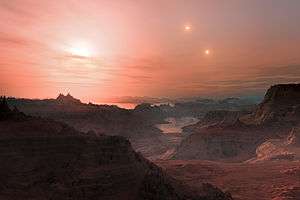2012 KT42
| Designations | |
|---|---|
| Apollo, NEO | |
| Orbital characteristics[1] | |
| Epoch 13 January 2016 (JD 2457400.5) | |
| Uncertainty parameter 5 | |
| Aphelion | 2.4839 AU (371.59 Gm) |
| Perihelion | 0.71144 AU (106.430 Gm) |
| 1.5977 AU (239.01 Gm) | |
| Eccentricity | 0.55470 |
| 2.02 yr (737.60 d) | |
| 261.31° | |
| 0° 29m 17.052s /day | |
| Inclination | 2.1932° |
| 69.515° | |
| 259.13° | |
| Earth MOID | 0.000968708 AU (144,916.7 km) |
| Jupiter MOID | 2.87976 AU (430.806 Gm) |
| Physical characteristics | |
| Dimensions | ~4 to 10 metre[2] |
| 0.06057 h (3.634 min) | |
| 29,[3] 29.0[1] | |
|
| |
2012 KT42 is an Apollo near-Earth asteroid discovered by Alex R. Gibbs of the Mt. Lemmon Survey (part of the Catalina Sky Survey) with a 1.5-m reflector + CCD on May 28, 2012.
Overview
The asteroid had a close approach to the Earth on May 29, 2012, approaching to only ~8950 miles / ~14,440 km above the planet's surface. This means 2012 KT42 came inside the Clarke Belt of geosynchronous satellites. As of May 28, 2012, the estimated 5 to 10 meter wide asteroid ranked #6 on the top 20 list of closest-approaches to Earth. There was no danger of a collision during the close approach. 2012 KT42 would pass roughly 0.01 AU (1,500,000 km; 930,000 mi) from Venus on 2012 July 8.[1]
It is estimated that an impact would produce an upper atmosphere air burst equivalent to 11 kt TNT,[4] roughly equal to Hiroshima's Little Boy. The asteroid would be vaporized as these small impacts occur approximately once per year. A comparable-sized object caused the Sutter's Mill meteorite in California on 2012 April 22. It was removed from the Sentry Risk Table on 2012 May 30.[5]
References
- 1 2 3 "JPL Close-Approach Data: (2012 KT42)" (last observation: 2012-05-29; arc: 1 day; uncertainty: 5). Retrieved 1 April 2016.
- ↑ "Conversion of Absolute Magnitude to Diameter". Minor Planet Center. Retrieved 2012-05-30.
- ↑ "2012 KT42 Orbit". Minor Planet Center. 2012-05-29. Retrieved 2012-05-30.
- ↑ "Earth Impact Risk Summary: 2012 KT42". NASA/JPL Near-Earth Object Program Office. Retrieved 2012-05-29.
- ↑ "Date/Time Removed". NASA/JPL Near-Earth Object Program Office. Retrieved 2012-05-30.
External links
- JPL Small-Body Database Browser for 2012 KT42
- 2012 KT42 - Close Approach (Remanzacco Observatory in Italy)
- Images from Flyby (spaceweather.com)
- MPEC 2012-K66 : 2012 KT42 (Minor Planet Center Discovery announcement)
- Planetary Defense Blog post on 2012 KT42
- Video: Tiny Asteroid 2012 KT42 Crossing The Sky (universetoday May 29, 2012)
- The Peculiar Flyby of Asteroid 2012 KT42 (Pasquale Tricarico : May 29, 2012)
- 2012 KT42 at the JPL Small-Body Database


